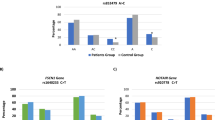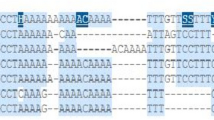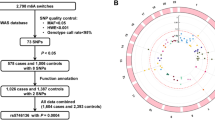Abstract
More and more evidence reveals that noncoding RNA miR-34b/c and tumor suppressor gene TP-53 independently, and/or jointly, play crucial roles in carcinogenesis. The purpose of the present hospital-based case–control study was to investigate the association between the miR-34b/c rs4938723 and TP53 Arg72Pro polymorphisms and the risk of gastric cancer. Two polymorphisms were genotyped in 419 gastric cancer patients and 402 age- and sex-matched cancer-free controls using polymerase chain reaction-restriction fragment length polymorphism analysis. The CC genotype and C allele of the miR-34b/c rs4938723 were associated with a significantly decreased risk of gastric cancer compared with the TT genotype and T allele (CC vs. TT: P = 0.006, adjusted odds ratio (OR) = 0.53, 95 % confidence interval (95 % CI) = 0.34–0.83; C vs. T: P = 0.005, adjusted OR = 0.75, 95 % CI = 0.61–0.92). Compared with individuals with the wild-type TT genotype, subjects with the variant genotypes (CT + CC) had a significantly decreased risk of gastric cancer (P = 0.047, adjusted OR = 0.75, 95 % CI = 0.57–0.99). Stratified analysis showed that the association between the risk of gastric cancer and the variant genotypes of miR-34b/c was more profound among men. However, no overall association was found between the TP53 Arg72Pro polymorphism and gastric cancer risk. In the combined analysis, no effects of the interaction of miR-34b/c rs4938723 and TP53Arg72Pro on gastric cancer risk were observed. Our findings indicate that the miR-34b/c rs4938723 CT/CC genotypes may be associated with a decreased risk of gastric cancer and the C allele may be a protective factor in gastric cancer.


Similar content being viewed by others
References
Crew KD, Neugut AI. Epidemiology of gastric cancer. World J Gastroenterol. 2006;12(3):354–62.
Ushijima T, Sasako M. Focus on gastric cancer. Cancer Cell. 2004;5(2):121–5.
Correa P. Human gastric carcinogenesis: a multistep and multifactorial process—first American Cancer Society award lecture on cancer epidemiology and prevention. Cancer Res. 1992;52(24):6735–40.
Wu MS, Chen CJ, Lin JT. Host-environment interactions: their impact on progression from gastric inflammation to carcinogenesis and on development of new approaches to prevent and treat gastric cancer. Cancer Epidemiol Biomarkers Prev. 2005;14(8):1878–82. doi:10.1158/1055-9965.EPI-04-0792.
Zhu H, Yang L, Zhou B, Yu R, Tang N, Wang B. Myeloperoxidase G-463A polymorphism and the risk of gastric cancer: a case–control study. Carcinogenesis. 2006;27(12):2491–6. doi:10.1093/carcin/bgl121.
Gu H, Yang L, Tang N, Zhou B, Zhu H, Sun Q, et al. Association of endothelin-converting enzyme-1b C-338A polymorphism with gastric cancer risk: a case–control study. Eur J Cancer. 2008;44(9):1253–8. doi:10.1016/j.ejca.2007.09.013.
Yang L, Gu HJ, Zhu HJ, Sun QM, Cong RH, Zhou B, et al. Tissue inhibitor of metalloproteinase-2 G-418C polymorphism is associated with an increased risk of gastric cancer in a Chinese population. Eur J Surg Oncol. 2008;34(6):636–41. doi:10.1016/j.ejso.2007.09.003.
Rozan LM, El-Deiry WS. p53 downstream target genes and tumor suppression: a classical view in evolution. Cell Death Differ. 2007;14(1):3–9. doi:10.1038/sj.cdd.4402058.
Lane DP. Cancer. p53, guardian of the genome. Nature. 1992;358(6381):15–6.
Naccarati A, Polakova V, Pardini B, Vodickova L, Hemminki K, Kumar R, et al. Mutations and polymorphisms in TP53 gene—an overview on the role in colorectal cancer. Mutagenesis. 2012;27(2):211–8. doi:10.1093/mutage/ger067.
Ara S, Lee PS, Hansen MF, Saya H. Codon 72 polymorphism of the TP53 gene. Nucleic Acids Res. 1990;18(16):4961.
Hadhri-Guiga B, Toumi N, Khabir A, Sellami-Boudawara T, Ghorbel A, Daoud J, et al. Proline homozygosity in codon 72 of TP53 is a factor of susceptibility to nasopharyngeal carcinoma in Tunisia. Cancer Genet Cytogenet. 2007;178(2):89–93. doi:10.1016/j.cancergencyto.2007.05.013.
Jiang P, Liu J, Zeng X, Li W, Tang J. Association of TP53 codon 72 polymorphism with cervical cancer risk in Chinese women. Cancer Genet Cytogenet. 2010;197(2):174–8. doi:10.1016/j.cancergencyto.2009.11.011.
Gao LB, Li LJ, Pan XM, Li ZH, Liang WB, Bai P, et al. A genetic variant in the promoter region of miR-34b/c is associated with a reduced risk of colorectal cancer. Biol Chem. 2013;394(3):415–20. doi:10.1515/hsz-2012-0297/j/bchm.2013.394.issue-3/hsz-2012-0297/hsz-2012-0297.xml.
Denisov EV, Cherdyntseva NV, Litvyakov NV, Slonimskaya EM, Malinovskaya EA, Voevoda MI, et al. TP53 mutations and Arg72Pro polymorphism in breast cancers. Cancer Genet Cytogenet. 2009;192(2):93–5. doi:10.1016/j.cancergencyto.2009.03.014.
Fernandez-Rubio A, Lopez-Cima MF, Gonzalez-Arriaga P, Garcia-Castro L, Pascual T, Marron MG, et al. The TP53 Arg72Pro polymorphism and lung cancer risk in a population of Northern Spain. Lung Cancer. 2008;61(3):309–16. doi:10.1016/j.lungcan.2008.01.017.
Chang TC, Wentzel EA, Kent OA, Ramachandran K, Mullendore M, Lee KH, et al. Transactivation of miR-34a by p53 broadly influences gene expression and promotes apoptosis. Mol Cell. 2007;26(5):745–52. doi:10.1016/j.molcel.2007.05.010.
He L, He X, Lim LP, de Stanchina E, Xuan Z, Liang Y, et al. A microRNA component of the p53 tumour suppressor network. Nature. 2007;447(7148):1130–4. doi:10.1038/nature05939.
Xu Y, Liu L, Liu J, Zhang Y, Zhu J, Chen J, et al. A potentially functional polymorphism in the promoter region of miR-34b/c is associated with an increased risk for primary hepatocellular carcinoma. Int J Cancer. 2011;128(2):412–7. doi:10.1002/ijc.25342.
Bossard P, Zaret KS. GATA transcription factors as potentiators of gut endoderm differentiation. Development. 1998;125(24):4909–17.
Chou J, Provot S, Werb Z. GATA3 in development and cancer differentiation: cells GATA have it! J Cell Physiol. 2010;222(1):42–9. doi:10.1002/jcp.21943.
Son MS, Jang MJ, Jeon YJ, Kim WH, Kwon CI, Ko KH, et al. Promoter polymorphisms of pri-miR-34b/c are associated with hepatocellular carcinoma. Gene. 2013;524(2):156–60. doi:10.1016/j.gene.2013.04.042.
Zhang S, Qian J, Cao Q, Li P, Wang M, Wang J, et al. A potentially functional polymorphism in the promoter region of miR-34b/c is associated with renal cell cancer risk in a Chinese population. Mutagenesis. 2014;29(2):149–54. doi:10.1093/mutage/geu001.
Li L, Sima X, Bai P, Zhang L, Sun H, Liang W, et al. Interactions of miR-34b/c and TP53 polymorphisms on the risk of intracranial aneurysm. Clin Dev Immunol. 2012;2012:567586. doi:10.1155/2012/567586.
Li L, Wu J, Sima X, Bai P, Deng W, Deng X, et al. Interactions of miR-34b/c and TP-53 polymorphisms on the risk of nasopharyngeal carcinoma. Tumour Biol. 2013;34(3):1919–23. doi:10.1007/s13277-013-0736-9.
Wei YG, Liu F, Li B, Chen X, Ma Y, Yan LN, et al. Interleukin-10 gene polymorphisms and hepatocellular carcinoma susceptibility: a meta-analysis. World J Gastroenterol. 2011;17(34):3941–7. doi:10.3748/wjg.v17.i34.3941.
Zhang YM, Zhou XC, Xu Z, Tang CJ. Meta-analysis of epidemiological studies of association of two polymorphisms in the interleukin-10 gene promoter and colorectal cancer risk. Genet Mol Res. 2012;11(3):3389–97. doi:10.4238/2012.September.25.7.
Christoffersen NR, Shalgi R, Frankel LB, Leucci E, Lees M, Klausen M, et al. p53-independent upregulation of miR-34a during oncogene-induced senescence represses MYC. Cell Death Differ. 2010;17(2):236–45. doi:10.1038/cdd.2009.109.
Hermeking H. The miR-34 family in cancer and apoptosis. Cell Death Differ. 2010;17(2):193–9. doi:10.1038/cdd.2009.56.
Kim NH, Kim HS, Kim NG, Lee I, Choi HS, Li XY, et al. p53 and microRNA-34 are suppressors of canonical Wnt signaling. Sci Signal. 2011;4(197):ra71. doi:10.1126/scisignal.2001744.
Tazawa H, Tsuchiya N, Izumiya M, Nakagama H. Tumor-suppressive miR-34a induces senescence-like growth arrest through modulation of the E2F pathway in human colon cancer cells. Proc Natl Acad Sci U S A. 2007;104(39):15472–7. doi:10.1073/pnas.0707351104.
Suzuki R, Yamamoto E, Nojima M, Maruyama R, Yamano HO, Yoshikawa K, et al. Aberrant methylation of microRNA-34b/c is a predictive marker of metachronous gastric cancer risk. J Gastroenterol. 2013. doi:https://doi.org/10.1007/s00535-013-0861-7.
Toyota M, Suzuki H, Sasaki Y, Maruyama R, Imai K, Shinomura Y, et al. Epigenetic silencing of microRNA-34b/c and B-cell translocation gene 4 is associated with CpG island methylation in colorectal cancer. Cancer Res. 2008;68(11):4123–32. doi:10.1158/0008-5472.CAN-08-0325.
Song HR, Kweon SS, Kim HN, Piao JM, Yun WJ, Choi JS, et al. p53 codon 72 polymorphism in patients with gastric and colorectal cancer in a Korean population. Gastric Cancer. 2011;14(3):242–8. doi:10.1007/s10120-011-0034-4.
Shen H, Solari A, Wang X, Zhang Z, Xu Y, Wang L, et al. P53 codon 72 polymorphism and risk of gastric cancer in a Chinese population. Oncol Rep. 2004;11(5):1115–20.
Sul J, Yu GP, Lu QY, Lu ML, Setiawan VW, Wang MR, et al. P53 codon 72 polymorphisms: a case–control study of gastric cancer and potential interactions. Cancer Lett. 2006;238(2):210–23. doi:10.1016/j.canlet.2005.07.004.
Acknowledgments
This work was financially supported by the “Medical ZhongDianRenCai Project” of Jiangsu Province (grant no. RC2011059), the Natural Science Foundation of Jiangsu Province (grant no. BK20131447 (DA13)), “Six RenCai Gaofeng,” “333 Project,” and the Priority Academic Program Development of Jiangsu Higher Education Institutions (PAPD) (grant no. JX10231801).
Conflicts of interest
None
Author information
Authors and Affiliations
Corresponding author
Additional information
Chao Yang, Xiang Ma, and Dongxiao Liu contributed equally to this work.
Rights and permissions
About this article
Cite this article
Yang, C., Ma, X., Liu, D. et al. Promoter polymorphisms of miR-34b/c are associated with risk of gastric cancer in a Chinese population. Tumor Biol. 35, 12545–12554 (2014). https://doi.org/10.1007/s13277-014-2574-9
Received:
Accepted:
Published:
Issue Date:
DOI: https://doi.org/10.1007/s13277-014-2574-9




